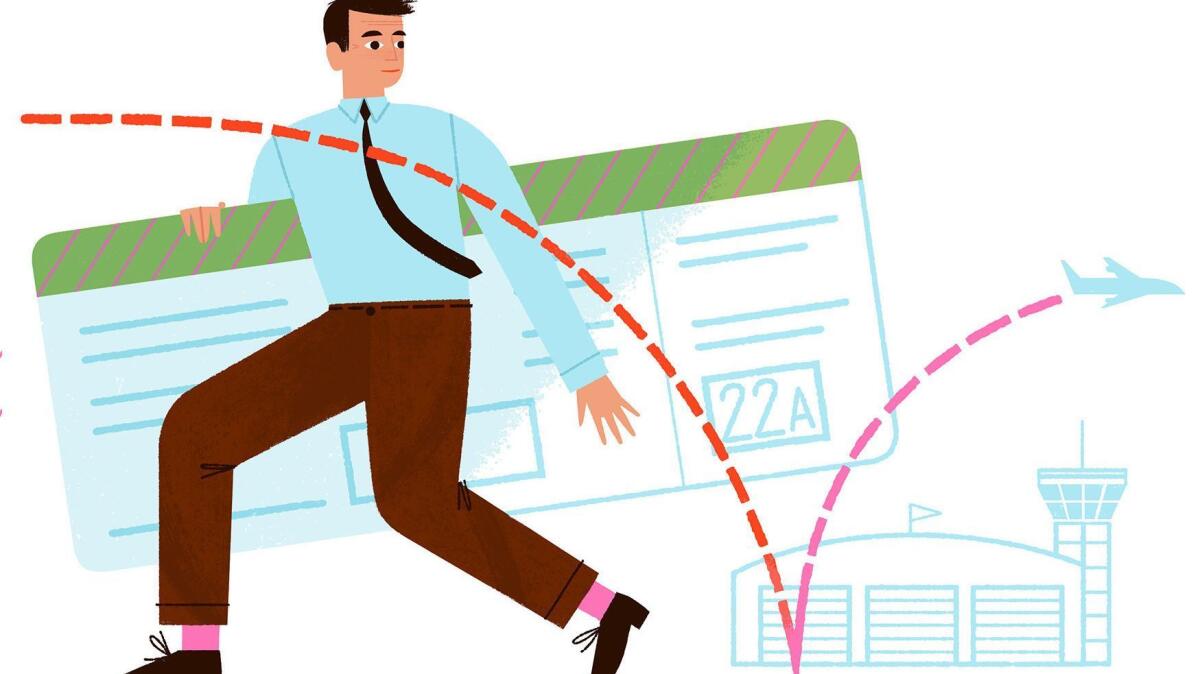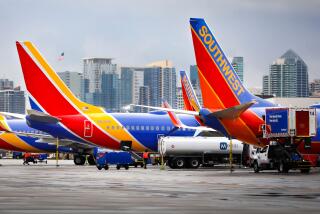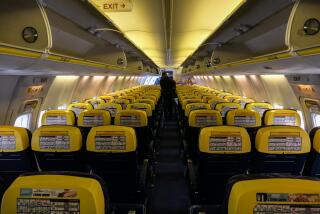If you’re going to miss your flight, call the airline. Immediately. And be nice

We have no control over some of the misfortunes of air travel. The flight is late or worse, canceled, because of weather, mechanical or crew problems, sending a ripple through your travel plans. That is annoying, but there’s a category of travel problems that’s even worse because you didn’t know you’d agreed to certain rules. Welcome to the self-inflicted travel wound.
An L.A. area colleague needed to get to a close-enough-to-drive destination, then fly back to attend to matters in L.A., then fly back to the destination, from which he would drive home. For your scorecard, he is sandwiching a return to L.A. between the bookends of his out-of-town trip.
Plans changed, as they often do, and instead of flying back to L.A. to attend to the matter at hand, he drove. But he forgot to cancel the flight he was supposed to be on.
He didn’t just lose the first part of his fare; he lost the whole thing.
He was livid at the airline, but the finger-wagging should have been directed not at the airline but at himself.
“If someone simply opts not to take a flight in the itinerary and it’s not due to an airline-related issue, then they are generally out of luck,” Brett Snyder, formerly an airline employee and now president of CrankyFlier.com, which deals with airline questions, and CrankyConcierge.com, which offers air travel assistance, said in an email.
Insert sputtering here, along with an outraged, “How is that even possible?”
It’s possible because that’s what he agreed to when he bought the ticket. And it’s not just this unhappy fellow; it’s all of us.
The rules for occasions like this and many others are in the terms and conditions, sometimes called the contract of carriage or the conditions of carriage, that every major airline has. You agree to them when you buy your ticket. If you don’t abide by them, you pay the price, which is generally higher for the fares for which you have paid the least — that is, the nonrefundable ticket.
Here’s what Southwest, the airline on which this happened, says: Its least-expensive fare, the Wanna Get Away, must be canceled at least 10 minutes before departure. “If the customer does not travel, all segments associated with the reservation are canceled and funds associated with…the fare are forfeited.”
If you have other kinds of fares, including the pricier business-select one, all reservations are canceled, but you get a travel credit. If it’s a ticket that has a mix of fares, the corresponding rules will be applied.
Part of the reason for this line-in-the-sand rule is financial: A no-show means the seat you would have occupied but for your mind lapse cannot be re-sold. Therefore, the airline is going to act as though you’re there and keep your money.
But why cancel the entire ticket and keep the money?
American Airlines’ contract holds the answer: “Reservations made to exploit or circumvent fare and ticket rules are strictly prohibited.” It goes on to say that you may not “purchase a ticket without intending to fly all the flights [in order to] gain lower fares (hidden cities).”
Exploit? Circumvent? Hidden cities? Yes. Here’s how this scheme works.
Let’s say you want to go to Cincinnati, but the fares are high. You find a round-trip fare to a primary city (that is, a city that has plenty of air service and cheaper fares, even though it’s geographically farther away) that includes a stop in Cincinnati. You leave the plane there and applaud your cleverness.
Trust us when we say the airline is not applauding you. If it finds out, it may kick you out of its frequent-flier program and confiscate your miles.
If it’s like Lufthansa, it may sue you. The airline recently went after a passenger who used an Oslo-Seattle round-trip ticket to get a better fare to Berlin. Lufthansa wants the $2,400 or so in revenue it didn’t get plus interest. The case was thrown out, but Lufthansa is appealing, CNN reported.
Why is the hidden cities practice wrong in the airline’s eyes? In most cases, the contract generally is not on your side. Here’s what Lufthansa’s contract says: “A service charge may be payable by any passenger who…fails to arrive for departure at the airport or any other point of departure by the time we have specified and, as a consequence, does not use the seat for which a reservation has been made.”
American Airlines is unequivocal about its thoughts on this practice. Its contract has a category called “Exploiting fare rules,” and if you engage in this behavior, it can cancel the part of your ticket you didn’t use, decline to let you fly, keep your money, and my favorite, “Charge you for what the ticket would have cost if you hadn’t booked it fraudulently.”
My colleague wasn’t trying to be unscrupulous; he was just overwhelmed and didn’t know the rules. It’s an expensive lesson to learn.
To avoid being a student of that lesson, here’s what you need to do:
►If you are going to miss your flight — you overslept, there was a wreck on the freeway and snarled traffic, you misread the time — call and explain what has happened/is happening. Ask for help in rebooking if you still intend to go.
►Even if it’s not your fault (you miss a connecting flight because your first flight was late), you should call. “If the traveler misses a flight due to an airline-related issue, then it is always best to talk to someone at the airline to make sure that the return isn’t canceled,” Snyder said.
“The systems are automated so that if that flight is missed, the rest of the itinerary cancels. Usually in a situation where the airline knows it’s a missed connection, there are other automated systems that will rebook the passenger on the next flight.”
I didn’t need to be on the next flight when I missed a connection in Dallas. I needed to be where I was going by 11 a.m. the next day, and there was no airline that could get me there. I rented a car and drove the last 300 miles.
As the wipers slap-slapped against the windshield and I wondered why I had been foolish enough to book the last flight of the day, I still remembered to call the airline and ask the agent to cancel whatever flight was rebooked but to preserve the return ticket, which she did. The return flight was intact when I flew home the next day.
Three more important takeaways:
►Make sure you have the airline’s customer service number saved in your phone.
►Call. Don’t leave it to chance. I asked Snyder if my return ticket would have been OK because it wasn’t my fault. “If someone decides to drive the last leg, then that would still cause problems down the line,” he said.
►Be nice. If you’ve made a mistake, throw yourself on the airline’s mercy. Be humble. The worst that can happen: People will accuse you of being polite.
There are worse things you can be called — including being called into court. Just ask that Lufthansa passenger.
Have a travel problem or dilemma? Write to travel@latimes.com. We regret we cannot answer every inquiry.
More to Read
Sign up for The Wild
We’ll help you find the best places to hike, bike and run, as well as the perfect silent spots for meditation and yoga.
You may occasionally receive promotional content from the Los Angeles Times.







